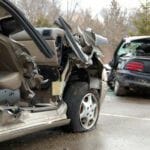What Does “Loss of Consortium” Mean?
August 6, 2018 / Personal Injury
In a personal injury case, most of the damage claims are based on the injuries and suffering of the accident victim; but some damages are based on the suffering of loved ones. One of these types of damages is called loss of consortium.
You may have heard the phrase and wondered about it. Generally, loss of consortium is intended to compensate the victim’s loved ones for the repercussions that the victim’s injuries or death have caused. Specifically, it applies to relationship losses that occurred between the accident victim and the loved one(s).
While some states permit long-term partners and children to seek loss of consortium damages, in Indiana, loss of consortium is limited to spouses. Damages can be sought for the loss of love, companionship, affection, support, and intimate relations. The Indiana Supreme Court has held that damage recovery for loss of consortium is valid for the “loss of care, love and affection” of a spouse, even though Indiana law contains no specific provisions for loss of consortium damages (Durham v. U-Haul Intern, 745 N.E.2d 755, 765 (Ind. 2001).
Determining Loss of Consortium Damages
Loss of consortium is one of the non-economic damages you can seek in an Indiana personal injury case. Also known as general damages, non-economic damages are difficult to quantify, and no clear rule for calculating them exists. However, in the case of a spouse who is claiming loss of consortium, answers to the following questions will usually be sought by the court in order to determine damages:
- Was the marriage a loving and stable one?
- How has the marriage changed since the accident?
- What is the nature of the consortium loss, and how long is it expected to last?
- What are the spousal living arrangements, and have they changed?
- What is the life expectancy for each spouse?
Other factors that may be taken into account include mental anguish, shock, emotional distress, and feelings of embarrassment and humiliation.
Loss of Consortium Case Examples
Here are some examples of possible loss of consortium cases:
- A husband’s fall at work fractures vertebrae in his back, leaving him paralyzed and sexually dysfunctional. The couple was planning on having children, but that is no longer possible.
- A wife’s car crash puts her in a coma, leaving her unable to provide any companionship or affection to her husband.
- A husband dies in a motor vehicle collision, leaving his wife permanently without his love, care, and companionship.
Proving Loss of Consortium
Even if you establish that another party’s negligence caused the death or injury of your spouse, doing so does not automatically prove loss of consortium. The spouse will be required to provide evidence of losses suffered. Doing so may include testifying about the private side of your marriage, including the status and extent of your sexual relations. While it can be painful to experience, discussing the details of your private life is the only way that the court can assess the extent of the damages that should apply to the claim. The assistance and compassion of an accomplished Indiana personal injury lawyer can be your much-needed support during challenging courtroom situations.
Let us put our resources to work for you.
If someone’s negligent or reckless actions have caused a catastrophic injury to you or to a loved one, it is your right to seek compensation in a personal injury lawsuit. In such a case, legal representation by a knowledgeable and trustworthy legal professional is essential. We suggest you talk with the skilled and caring attorneys at Stephenson Rife. Both Mike Stephenson, with his more than three decades of personal injury experience, and Brady Rife, with his familiarity concerning diverse types of personal injury cases, always strive for the highest standards of client care.
Our Indianapolis catastrophic injury lawyers will fight for you. The resources of Stephenson Rife can be your means of achieving justice when someone you care for is the victim of another person’s negligence. What is your next step? You can start now by calling Mike or Brady, or you can use our online contact form for a free evaluation of your claim.

 Mike Stephenson has 40 years of experience and is a trusted advisor to many individuals and companies. His current practice is dominated by civil litigation in state and federal courts. He focuses much of his time on handling catastrophic injuries caused by all types of accidents, including motor vehicle, trucking, workplace injuries, product liability, and fire, just to name a few. He also works extensively in construction accidents. [
Mike Stephenson has 40 years of experience and is a trusted advisor to many individuals and companies. His current practice is dominated by civil litigation in state and federal courts. He focuses much of his time on handling catastrophic injuries caused by all types of accidents, including motor vehicle, trucking, workplace injuries, product liability, and fire, just to name a few. He also works extensively in construction accidents. [ 